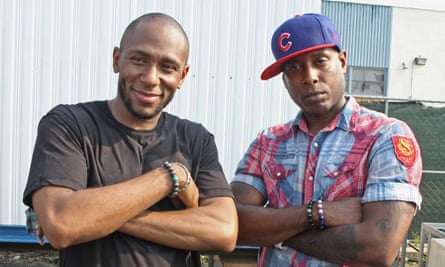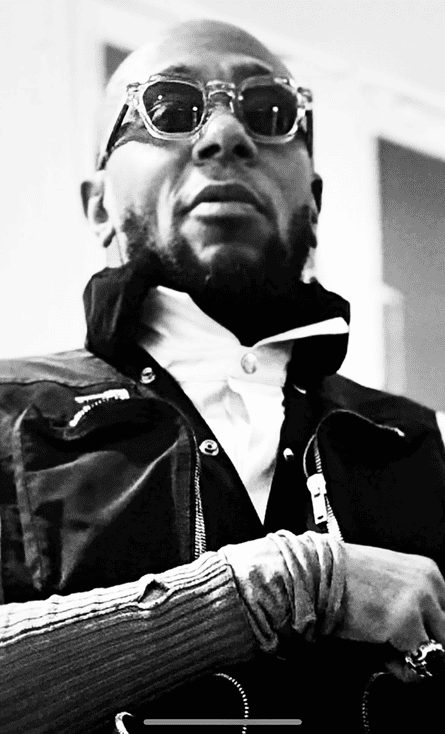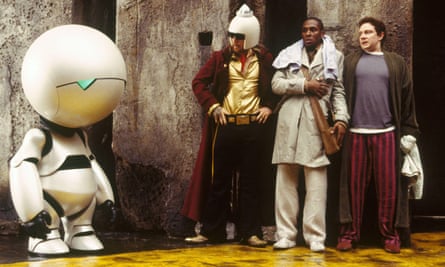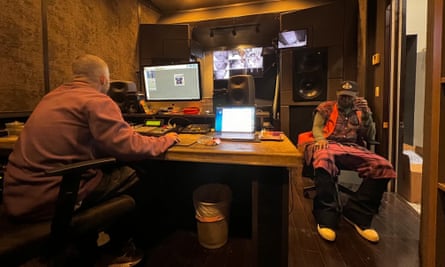It’s the penultimate night of Paris fashion week, and at Le Trianon, a storied 1,000-capacity music hall beneath Montmartre, Yasiin Bey – the artist formerly known as Mos Def – is holding court. “Fashion week is exhausting, especially when you be swagging this hard,” grins the dandyish MC and sometimes streetwear designer. “People see me and be like: ‘What’s the event?’ Today. Life is the event.”
Bey is showcasing his new project, Forensics, a partnership with DJ and producer the Alchemist (Eminem, Nas, Earl Sweatshirt). Over beats steeped in psychedelia and spiritual soul, Bey skips between the personal and political with profundity, as has long been his gift. This is Bey’s deepest, most focused work in years, from Ondasz, a meditation on resistance that finds Bey reflecting: “I don’t know if Goliath made David afraid / But I do know David threw his stone anyway,” to Kidjani, a mesmerising, moving tribute to his late mother, Sheron Smith (the “Umi” in his 1999 hit Umi Says). The material signals a rebirth for an MC and movie star who, for the last decade and a half, seemed content to disappear from the limelight.
“I’m a Hollywood runaway – don’t tell ’em my whereabouts!” he grins a week later, in the snug of London’s Chiltern Firehouse hotel. He wasn’t always on the run from fame. As a child actor, Bey toiled in community theatre and off-off-off-Broadway productions, before scoring roles in TV movies and short-lived sitcoms. By 1995, he was Bill Cosby’s teenage sidekick in The Cosby Mysteries.

However, his true focus had shifted elsewhere – to the now-legendary freestyle rap sessions in New York’s Washington Square Park. In 2017, future rap partner Talib Kweli told Desus & Mero that Bey was “hood-famous”, rapping against such underground stars as Supernatural, Mister Man (whose group Da Bush Babees Bey later guested with) and Agallah. Bey would “come round and buy people sandwiches”, Kweli continued, “because he had a job. He was doing his acting thing and coming to the park and rhyming.”
Although always on his way to or from another screen test, whenever Bey hit the park his commitment was unfailing, his skills inarguable. “I was young, flowing with the energy of the times and the city,” he remembers. “I saw a real shot at having this be a career. I knew I could do it. I didn’t know how, but I knew I could.”
His debut single, the sublime Universal Magnetic, arrived in 1997 on James Murdoch’s Rawkus, the hottest imprint within New York’s then insurgent underground hip-hop scene. The B-side, If You Can Huh! You Can Hear, found Bey ruminating, “Time is the asset / How you gonna spend it?” He certainly invested his wisely during these years, dropping the first album by Black Star, his superduo with Kweli, in 1998, with his debut Mos Def full-length, Black on Both Sides, arriving the following year. It came at the perfect moment – the nadir of the gangsta era, with the street verité of the genre’s early years now swapped for Puff Daddy’s soapy capitalist fantasies, and Bey’s socially conscious hip-hop was a welcome corrective.

“We had optimism and youthful naivety,” he says of these early days. “Talib and I were continuing great traditions laid down by our elders – Gil Scott-Heron, Curtis Mayfield, Coltrane. I felt for sure we were doing something special. We weren’t, like, ‘We’re rap stars!’” he chuckles, in his affable burr. “We didn’t need to be chart-toppers. We could afford groceries, we weren’t about to get evicted. We knew radio programmers didn’t wanna play our pro-Black shit while they were trying to sell skin cream. We knew we weren’t going to be media darlings.” He stops for a beat. “But then we kinda ended up being that, low-key.”
Indeed, Black on Both Sides translated its critical acclaim into commercial success, hitting No 3 in Billboard’s US Rap Albums chart and earning a gold disc, thanks to its breakout single, the winningly complex rap ballad, Ms Fat Booty, and the deftness with which Bey blended politics, warm humanism and sharp wit.
He scored key roles in movies such as Brown Sugar, The Italian Job and The Hitchhiker’s Guide to the Galaxy, but it was the almost routine experience of rejection that had perhaps the greatest impact on his art. “It was part of the game. Like, what, are you going to be brittle and fall apart? You just got to give your best, you can’t get folded up, like, ‘Mom, they don’t like me!’ You just gotta keep going. Confidence undimmed, he formed Black Jack Johnson, with luminaries from landmark Black rock and metal bands Bad Brains, Funkadelic and Living Colour. “I was trying to take all Limp Bizkit’s money!” he says. “It was my funky vendetta against what I felt was appropriation.” He seemed unstoppable.

“But then they foiled my plan,” he scowls. “The label said: ‘We don’t want a rock record, we want you doing that hippity-hop shit.’” His second album, 2004’s The New Danger, juggled rap tracks alongside his Black Jack Johnson material, but by then Bey’s momentum had ebbed away. A stronger third LP, 2006’s True Magic, was half-heartedly released after more friction with the label; it didn’t even have sleeve art.
He quit MCA, released 2009’s excellent The Ecstatic on indie label Downtown, and ditched the Mos Def moniker in 2012 in favour of Yasiin Bey, the name he’d been using privately since the late 90s. He showed little interest in playing the game he’d made his life’s work for years. In 2016 – a turbulent year that saw him exiled from South Africa, where he’d been living on an expired tourist visa for several years – Bey announced his retirement “from the recording industry … and Hollywood”.
“I was so disillusioned,” he says today, the pain still fresh. “You start out with idealism and passion, and then you encounter the kind of conduct and values George Orwell called ‘inanities’. And they do this shit to everybody, it’s not even personal, it’s systemic.” When the system itself changed, with the advent of streaming, he says artists got screwed even further. “That shit is gross,” he says, “paying people part of a penny for their music. Those motherfuckers are cold blooded, man like Scrooge McDuck, lickin’ his lips as he jumps into a pool of gold coins. The music industry of now makes the one I started out in seem charitable. It’s completely exploitative.”
The retirement didn’t hold. But Bey’s reluctance to cooperate with the streaming behemoths meant his subsequent work was often hard for fans to find. 2019’s Negus was an ambitious album/movie/installation you could only experience if you attended limited-engagement art events in Hong Kong or Marrakech. His long-awaited second album with Talib Kweli, 2022’s No Fear of Time, was solely available via the podcast network Luminary (it got a belated physical release last December).

For Forensics, Bey has devised a new scheme to evade the streaming paradigm. Merch on sale at shows and via Bandcamp – including lanyards and branded baseball caps – will contain digital “Bump tags” which, when tapped against a user’s smartphone, enable access to online Forensics content, including the group’s forthcoming studio release. “It’s lo-fi, hi-tech high art,” Bey says, tugging at his black cap emblazoned with “Forensics” in white type. “Our swag is superior, Lord have mercy. Do I look like I’m on some X-Files shit in this? I can’t wait to wear it to an airport. ‘Let him through security, he must be investigating something!’” Bey’s renaissance comes as the world is growing dark. At his fashion week event, he prefaced ROSITA Stone, a track about how the mighty mindlessly brutalise those about them, with what he described as “a Turkish parable: ‘When a clown enters a palace, that does not make him a king, but it may turn the palace into a circus.’” But today he speaks of hope, aware that giving into fear is no answer. “We’ve got to resist the despair,” he says. “It’s such a brutal situation, we have no choice but to be beautiful.”
He pauses, and sighs. “I’m just happy to be alive, to be able to create art and beauty, to the best of my ability. Like, to be a human being is a miracle. We’re on this spaceship, planet Earth, sharing this experience, and it’s crazy. Like, who needs peyote? We’re already in outer space, baby.” After too long on the outskirts of the universe, Yasiin Bey has picked up the mic once again.
Forensics’ streams and merch are available at yasiinbey.bandcamp.com. Their debut studio album is due in the spring.
Source: theguardian.com


